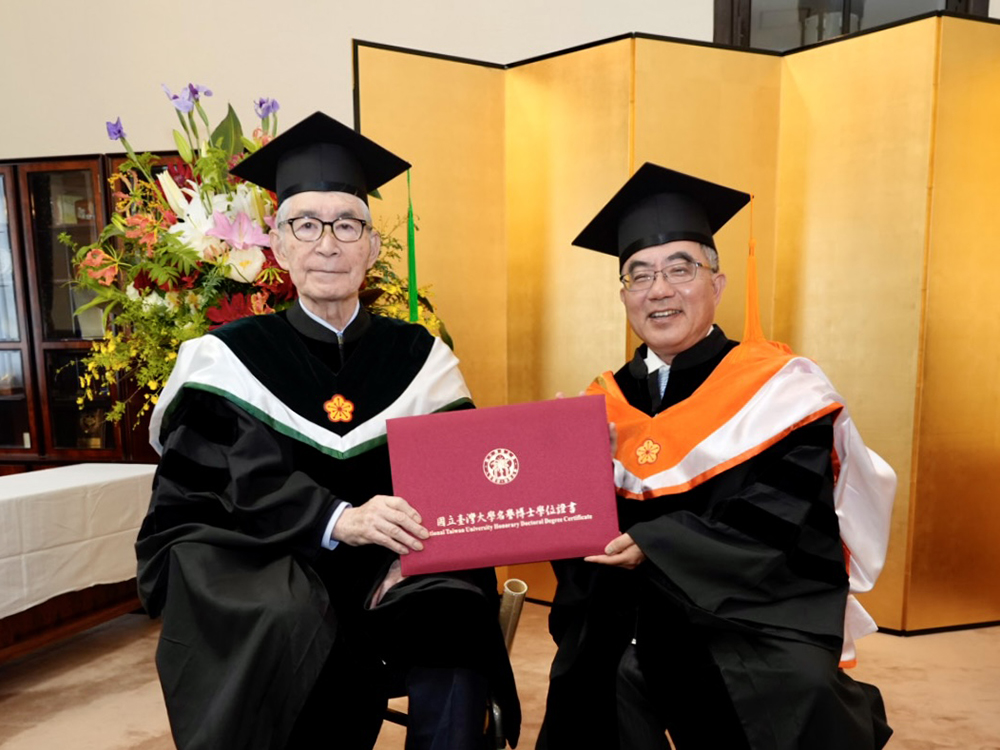
Nobel Laureate Prof. Tasuku Honjo Awarded NTU Honorary Doctorate
瀏覽器版本過舊,或未開啟 javascript
請更新瀏覽器或啟用 javascript
Spotlights
President Nagata of Tsukuba University delivered a lecture titled “Host Factor-dependent Virus Replication”.
President Nagata of Tsukuba University (right) engaged in the Q&A session moderated by President Chen (left). He answered questions from the audience ranging from the process of virus replication to the relationship between proteins and gene expression, as well as the challenges in future drug development.
President Nagata of Tsukuba University believes that AI will help reduce the time and cost of developing anti-cancer drugs.
Since its establishment in 20223, the NTU Royal Palm Lecture Series has invited outstanding scholars and entrepreneurs to speak on the NTU campus to bestow global visions upon faculty and students. On March 1, 2024, the 4th installment of the Royal Lecture Series has the distinguished honor of inviting the President of the University of Tsukuba, Prof. Kyosuke Nagata, to speak on the topic “Host Factor-dependent Virus Replication” at the College of Management Building. Prof. Nagata believes that artificial intelligence (AI) will help reduce the time and cost of developing cancer drugs, thus accelerating the development process. After the speech, he took questions from the audience, addressing topics such as the process of viral replication, the relationship between proteins and gene expression, and the challenges of future drug development. The audience left gaining profound insight into these topics.
Prof. Nagata has been serving as the President of the University of Tsukuba since 2013, and since 2019, he has also been serving as the President of the Japan Association of National Universities. After obtaining his Ph.D. in Pharmacy from the University of Tokyo in 1981, he pursued his career in the United States at the Albert Einstein College of Medicine and the Memorial Sloan Kettering Cancer Center. He returned to Japan in 1991 and held academic positions at the Tokyo Institute of Technology. In 2001, he joined the University of Tsukuba, where he assumed the role of President in 2013. Prof. Nagata's research interests encompass virology, molecular biology, and structural biochemistry.
The lecture’s host, NTU President Wen-Chang Chen, indicated that Prof. Nagata has been honored with numerous accolades for his outstanding academic contributions. These include honorary medals from Uzbekistan and Vietnam, honorary doctoral degrees from Malaysia and Tajikistan, as well as the Sugiura Award from the Japanese Society of Virology. In addition, in 2023, he was awarded the Second-Class Medal for Educational Contributions by the Ministry of Education in Taiwan. Prof. Nagata has widely participated in academic organizations, governmental committees, and Japanese and overseas associations. His overarching influence extends well beyond the academia.
Prof. Nagata initially focused on studying the cell cycle of cancer cells, particularly during the DNA replication phase (S phase). Using viruses as his primary material, he ingeniously discovered crucial factors involved in viral DNA replication within cells. He further found that adenoviruses could only replicate DNA and produce new viruses within host cells. Employing techniques from biochemistry and molecular biology, he successfully identified key factors in viral DNA replication.
Prof. Nagata believes that inhibiting DNA replication can impede cancer cell proliferation. To develop such drugs, he infected yeast cells with common cold viruses and then, through biochemical experiments, identified yeast proteins involved in virus DNA replication. He subsequently purified and analyzed the structures of these proteins, successfully developing drugs to inhibit virus DNA replication. The biggest challenge currently is virus resistance to drugs. He anticipates that with the assistance of artificial intelligence (AI), predicting virus mutations and screening the most suitable candidate proteins will reduce research time and costs, accelerating drug development.
NTU Royal Palm Lecture Series invites a diversity of distinguished speakers, including academic scholars, technical experts, NTU distinguished professors, highly-accomplished alumni, recipients of honorary doctorates, and influential entrepreneurs. These eminent speakers address pressing global issues and emerging technological frontiers, providing our students and faculty with precious, timely knowledge and insights. The plan is to host six lecturers each year, with the expectation that the rich experiences and wisdom of the distinguished guests will provide inspiration as well as insights to every attendee.
Current Spotlights